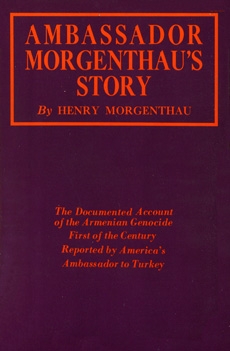| Éditeur : New Age Publishers | Date & Lieu : 1919, New York |
| Préface : | Pages : 408 |
| Traduction : | ISBN : |
| Langue : Anglais | Format : 130x195 mm |
| Code FIKP : Liv. Eng. Mor. Amb. 103 | Thème : Général |
|
Présentation
|
Table des Matières | Introduction | Identité | ||
 Ambassador Morgenthau’s Story | |||||
|
Hon. Henry Morgenthau Friend And Benefactor Sixty years ago a nation of more than two million people whose forbears had lived on the land continuously for some 2,500 years was not only uprooted en masse but almost totally decimated in the manner of European Jewry 25 years later. The two genocides were remarkably similar in method and inspiration. These pages show conclusively how Talaat and Enver, the Turkish hangmen, served as teacher and inspiration to Hitler and Himmler. New York Post-war Germany took pains to cleanse itself; it made public penance; it made restitution to victims; it brought war criminals to trial. Not so with the Turks who committed the first genocide of the century. None were brought to trial; to this day Turks will not admit their hideous guilt; not a penny has been paid in restitution for the billions looted in homes, churches, jewels, moneys, lands, the priceless remains of an incredibly rich cultural heritage, the extermination of some 1,600,000 Armenian lives through famine, disease, massacre, torture and deportation. By conservative estimate three fourths of the Armenian nation perished, as against one third of Jewry. Hitler died a fitting death in the ruins of Berlin. Talaat was finally assassinated in Germany, but his remains were brought to Turkey and respectfully laid to rest in Istanbul’s military cemetery. Thus Turkey exposed itself as a nation which to this day honors its Hitlers. Everything in Germany has now changed for the better. Basically the Turkish character has changed but little. Contrast Germany which honorably renounced barbarism, with Turkey - which procreated barbarism in the invasion of Cyprus. In the holocaust of 1915-20 the Allies protested vigorously but to no avail. One man above others, through his writings and speeches waged a heroic crusade for the Armenians. He defied the Talaats and the Kaiser’s emissaries in Turkey. He pierced the conscience of America and the world. If ever a people needed a friend and benefactor during the blood-letting of an historic nation it was Henry Morgenthau. This book is not only the story of an ambassador’s official performance, but that of a man with deep humanitarian instincts, compassion for the underdog and supreme qualities of courage and moral integrity. These traits made him unique among the men of his time and everlastingly blessed in the eyes of the Armenians. | ||||